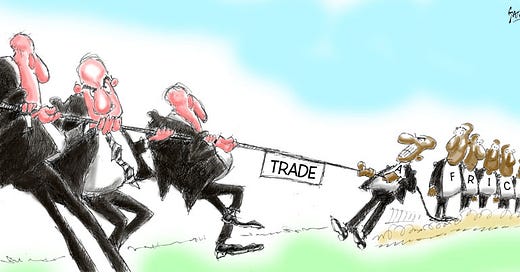We must lead the world or be damned
To get us from the back of the global bus to its steering wheel, pan-Africanism needs to be internationalist too.
Patrick Gathara
It’s easy to be sceptical of pan-Africanism. The notion that Africa isn’t just a geographical space but a metaphysical entity whose population, though genetically the most diverse on earth, shares culture, heritage and a common fate, can seem mystical and dubious. However, the idea is bred of necessity not genetics.
Pan-Africanism is less about how we interact among ourselves and more about how we face the world. Tanzania’s wise first president, the late Mwalimu Julius Nyerere, once said: “Africans all over the continent, without a word being spoken either from one individual to another or from one country to another, looked at the European, looked at one another, and knew that in relation to the European they were one.”
Today’s world order was established in the wake of the last major European tribal conflagration and has always put us at the back of the global bus. Little wonder then that when we go to “global negotiations” like the UN’s Conference of the Parties (COP) on climate, we come away with commitments that are worth less than the paper they are printed on.
Months before COP29, at a meeting in Abidjan, Côte d’Ivoire, African environment ministers called for the world to commit to providing $1.3-trillion a year in climate finance. Africa alone needs to invest $3-trillion by the end of this decade to adapt to the ways climate change is changing our ways of life, and to grow our economies in ways that don’t make it worse, says the African Development Bank.
In Baku this month, with just two days to COP29’s end and with no financial deal in sight, African delegates joined others in the G77 and China grouping to lower that ask to $500-billion a year. In the end, the Baku conference closed on just $300-billion a year, and long faces. And if the past is anything to go by, the reality may turn out to be even more depressing. The 2009 COP15 promised $100-billion by 2020.
That level of finance was reached not just late by two years, but with an “excessive use of loans” which essentially means the victims effectively subsidise their abusers.
We need to re-imagine the world order to one in which our concerns are taken seriously. West-centric models are not capable of reforming what the West built to deliver global justice.
Just as we cannot continue trusting the West to be custodians of global good, we cannot base our dreams of the future on its growth models: free markets, capitalism, maendeleo and other euphemisms for centuries of imperialism and colonial plunder.
It must be clear that the goal is to overthrow the current system, not find accommodation, or a better deal within it. Neither should we be seeking to lead the current order: to sit atop oppressive systems is not equality. “Black faces in high places won’t save us,” as Professor Ruha Benjamin in the United States reminded us earlier this year.
But how do we take the wheel after an age at the back of the global bus? We should look to build allies. And here the flexibility of pan-Africanism can help too. As Kwame Nkrumah said: “All people of African descent, whether they live in North America or South America, the Caribbean, or in any part of the world, are Africans and belong to the African nation.”





I always read The Continent with much interest (and often disagreement), but, while I can understand the frustrations resulting from the unsatisfactory outcome of the Baku COP meeting, I cannot resist reacting this time considering all the internal inconsistencies in this blog.
You say Africa shouldn't find accommodation with the current system, nor seek to lead it, but overthrow it, although the title of your blog says the opposite.
When you overthrow something, you have to replace it by an alternative which is not spelt out.
You say you have to build allies, but to do what?
And quoting Nkrumah, you suggest starting with "all people" of African descent, although also admitting that "black faces in high places won't save us", thereby also reducing Africans to their skin colour, despite the admitted genetical diversity? And are we not all of African descent? How long can we still be considered Africans then, once having left the continent (and reversely, how long do returnees to Africa have to live there to be accepted as "new Africans")?
You admit Africa's genetical diversity but end up with an indeed "mystical and dubious", essentialist concept of shared culture, to nevertheless end with the conclusion that Pan-Africanism is bred of (I guess economic and political) necessity.
But if Pan-Africanism is bred of necessity about "how to face the world", you have first to learn to interact among yourselves and find a common voice?